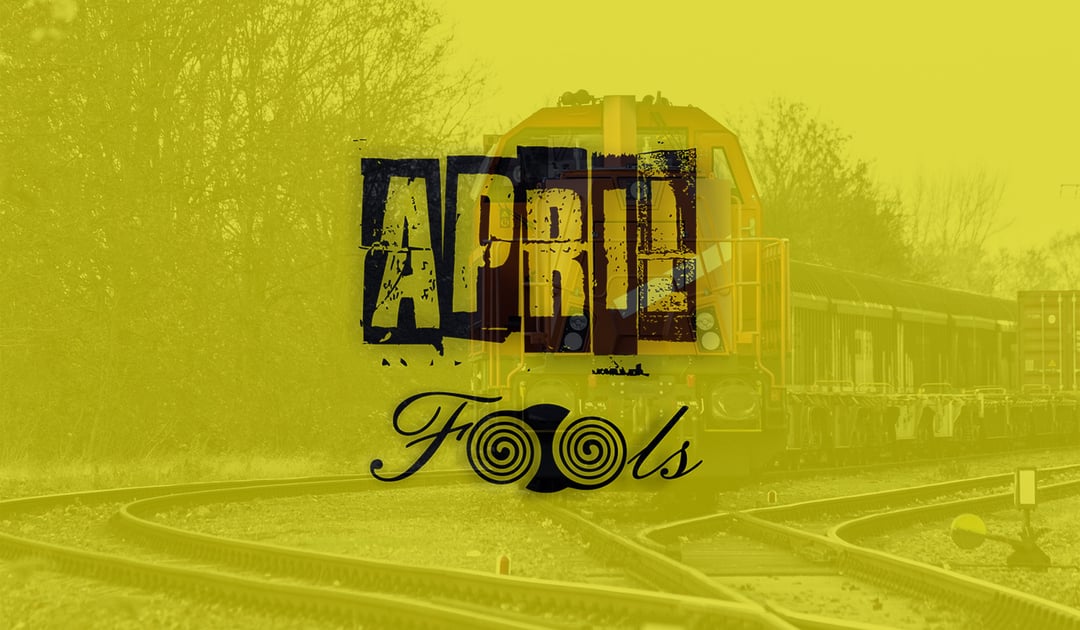
While pranksters circle April 1 on their calendars, another common feature of April Fools' Day is misdirection and deception. And intermodal transportation has been the victim of misperceptions for many a year, whether intentionally caused or simply due to ignorance. In honor of April Fools' Day - rather than creating new false stories like that George Washington invented pizza or that Taylor Swift designed the first ever pair of cargo pants - we thought we'd share five misconceptions of intermodal that have lingered over time and debunk them to help shippers who have neglected this freight mode feel a little less foolish.
Fool 1: Intermodal is slow
Many believe that shipping via intermodal and its associated rail transport component means loads will take much longer than those transported via truck. In reality, the average intermodal journey is only slightly longer - think truckload plus a day. So simply planning a bit further ahead will lead to still very reasonable delivery times. Taking it a step further, some intermodal lanes offer expedited service that offer the same transit times as trucks. There are only very specific - and rare - scenarios in which intermodal takes much longer than trucking, but again, that can be mitigated by planning ahead.
Fool 2: Intermodal is unreliable
Another common - and incorrect - perception that has lingered in many shippers' consciousness is the idea that rail carriers are unreliable and routinely miss deadlines. However, shippers sending products to big box retailers rely on rail to carry much of their freight, which often has seasonal tie-ins. It's unlikely this practice would continue if intermodal loads of Christmas decor arrived in January - as shippers would not only lose money due to lateness, they'd even face fines. To underline the reliability of intermodal further, the largest truckload carriers own about 40% of intermodal containers - meaning they see intermodal as a reliable supplement to their long-haul trucking business that faces its own staffing, regulatory, insurance and fuel-related challenges. As with many misconceptions, there was once a grain of truth to the idea that rail transit was less reliable, but railroads have addressed this by investing in infrastructure and technology - turning what was a deficit into a strength.
Fool 3: Intermodal shipments are more likely to be damaged or lost
The going thought among many is that intermodal shipments are more likely to be damaged due to the vibration of rail travel as well as the need to transfer loads between trucks and trains. However, a properly blocked and braced load faces no more likelihood of damage than a truckload-only shipment. Railroads even offer damage prevention units to help ensure shippers have properly secured their loads. As far as loss goes, intermodal shipments tend to be less prone to cargo theft than truckload, as they ship in secure containers that never hit rest stops or parking lots - some of the most common areas truckload shipments face theft. Instead they either keep moving or stop at highly secure railroad terminals.
Fool 4: Lack of competition affects pricing and service
Because there are significantly fewer Class I railroads than there are trucking carriers - think single digits versus tens of thousands - some believe railroads can rest on their laurels with a lack of competition. While it's generally true that they aren't competing with each other, railroads are competing with those tens of thousands of truckload carriers as they focus on highway to rail conversion. That means they need to at the very least match the service and pricing level of truckload - and often surpass it - to gain new business. Additionally, railroads often work together with trucking companies to offer truck-rail combinations which help both carriers and shippers through added flexibility, improved speed and reduced costs.
Fool 5: Intermodal is too complicated
Perhaps the greatest barrier to entry in the intermodal transportation space is simply that shippers are concerned it's too complicated to implement. But again, that perception is a thing of the past. No longer does the shipper need to do oodles of extra work to setup intermodal shipments. Now, that falls on the IMC (intermodal marketing company) and the railroads themselves as they offer door-to-door shipments that - to the shipper - are as simple as a truckload shipment. The IMC handles the behind the scenes legwork arranging origin and destination drays, linehaul, manifests, tracking and invoice reconciliation, so that the shipper deals with a simplified process that is no more difficult than a typical truck move. In other words, the shipper tenders the load to the IMC and they handle the rest - as the shipper gets a single invoice when the shipment is complete.
Now that these April Fools have been debunked, are you ready to incorporate intermodal into your shipping strategy? Just let us know and we'll follow up to discuss how to make intermodal work for your business. For more information about us, or logistics and supply chain issues in general, check out our Freight Guides.
Get Updates
Featured Articles
Categories
- Freight & Shipping Costs (52)
- Freight Broker (58)
- Freight Forwarder (2)
- Intermodal Transportation (180)
- International & Cross Border Logistics (43)
- Logistics & Supply Chain (413)
- Logistics Service Provider (76)
- LTL (39)
- Managed TMS (49)
- News (38)
- Supply Chain Sustainability (12)
- Transportation Management System (37)
- Truckload (120)
- Warehousing & Distribution (49)



